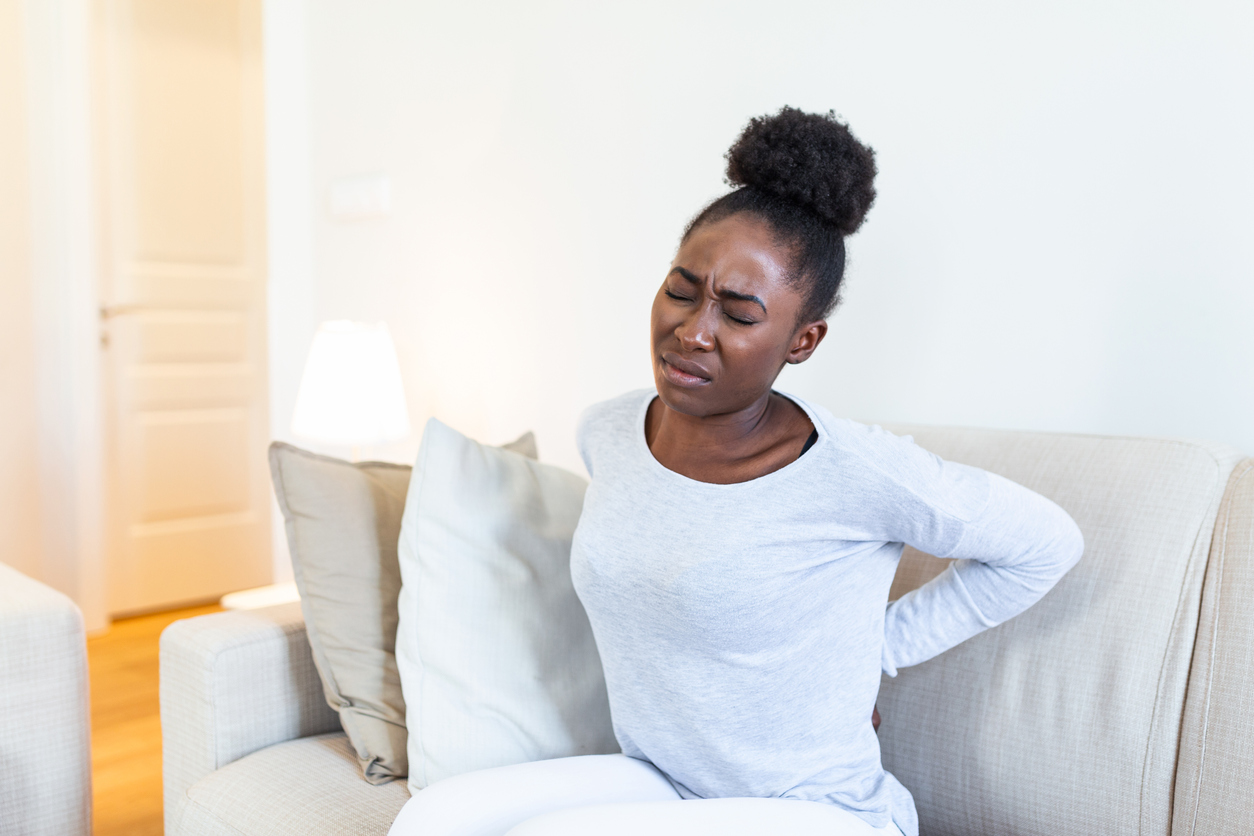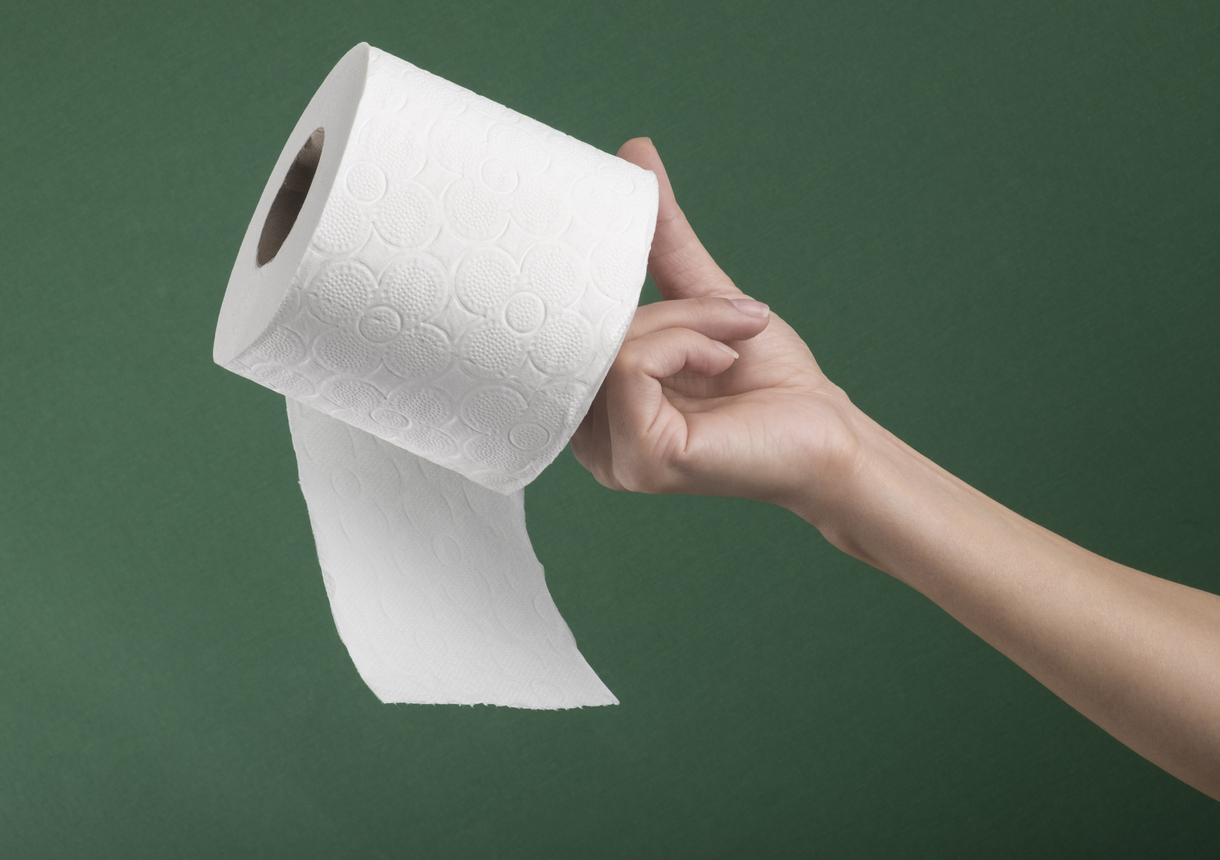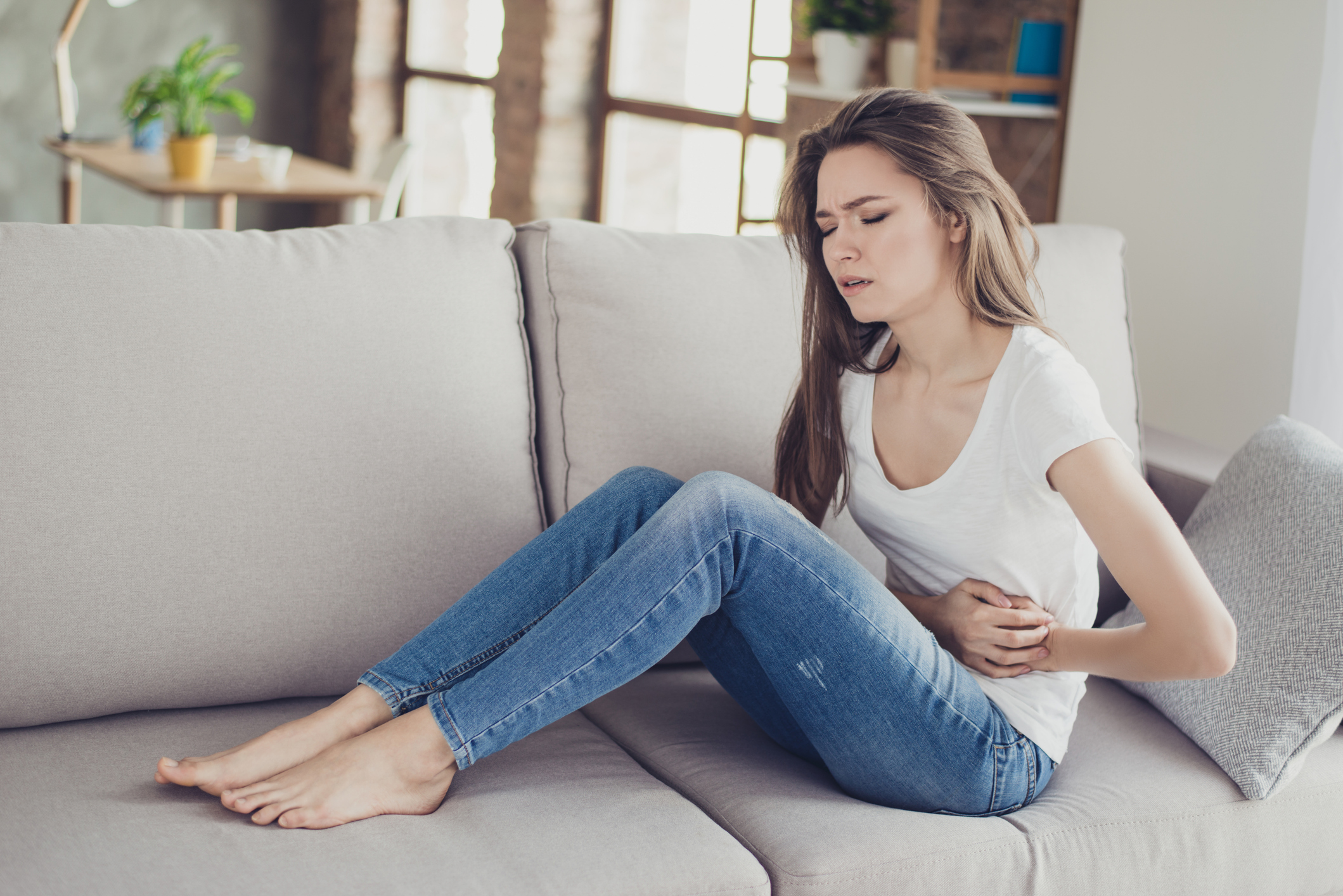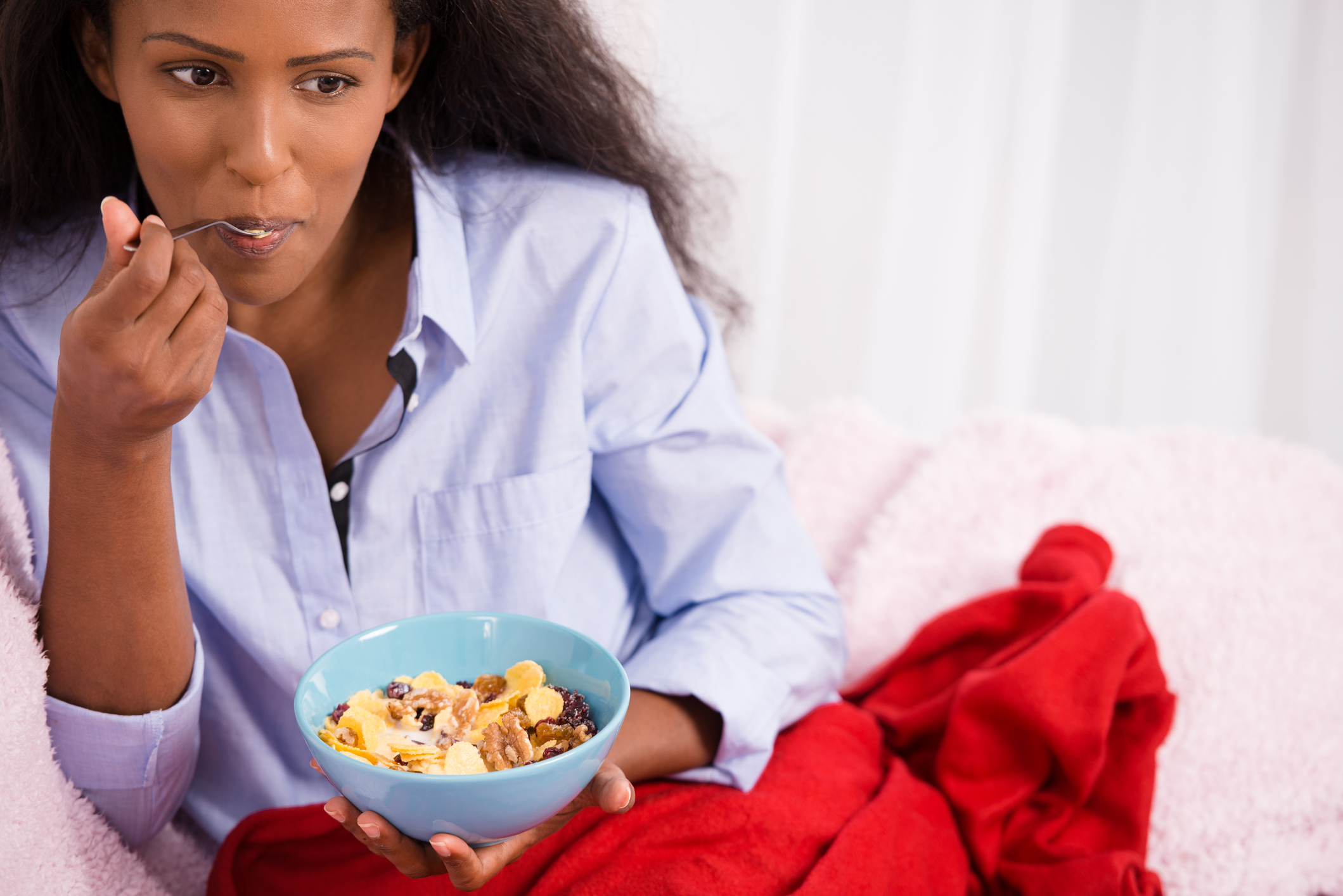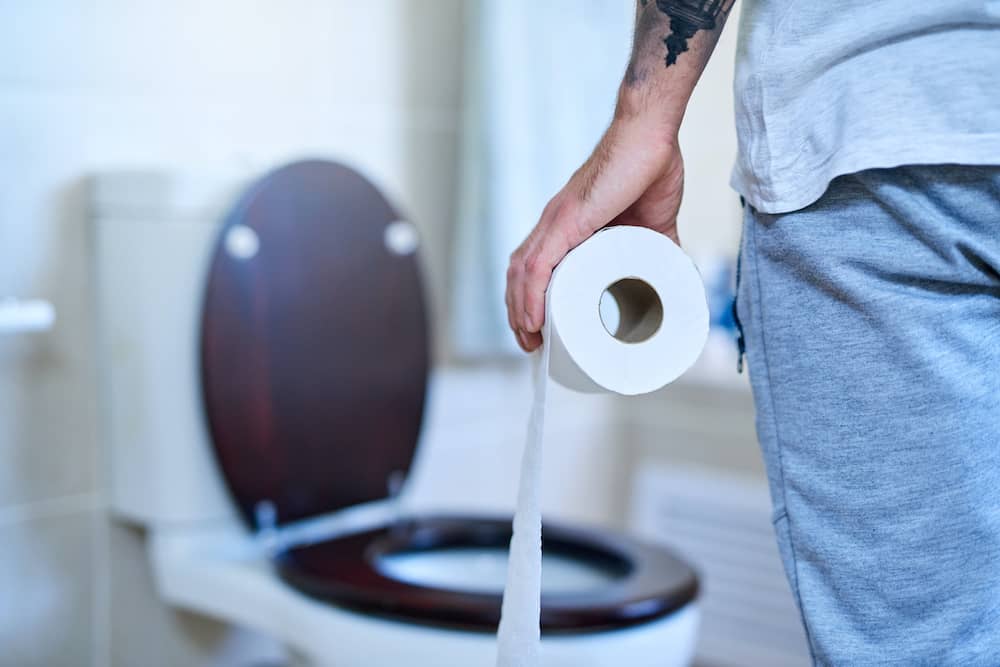What is constipation?
Constipation is when you find it hard to poo or can’t go as often as normal. It isn’t just a lack of pooing, though – it might also feel like you haven’t fully emptied yourself when you do manage to go, or that your tummy (stomach) is a bit blocked up.
Constipation is very common – about 1 in 7 people in the UK has it at any time – and there are lots of possible causes. Research also shows it more often affects women, especially if you’re going through hormonal changes. About 2 in 5 pregnant women will have constipation (usually in the first trimester), plus it’s common in the perimenopause and menopause, and in the run-up to your period.
If you’re embarrassed about finding it hard to poo, or think it isn’t worth bothering about, you’re not alone: studies have found many people don’t seek help because they don’t want to talk about it, or they think it’s not a serious health issue.
But research also shows it can have a big impact on your life, in the same way as long-term health conditions such as allergies or joint problems. It can make you feel embarrassed, low, and affect your confidence and self-esteem. It can also get in the way of your daily life – you might not feel like going to work or meeting friends for a meal if you feel uncomfortable or you’re worried about access to toilets. And it can be especially frustrating to have to deal with constipation alongside other symptoms of premenstrual syndrome (PMS), menopause or pregnancy.
So don’t think that you just have to put up with it. The good news is that constipation can improve in a few days or weeks, once you make some small adjustments to your diet and lifestyle – and these changes can also help prevent it happening again. And if you need more help, medicine from a pharmacist or a doctor can treat your symptoms. So read on to learn more, and help yourself feel better.
What are the symptoms of constipation?
You might be constipated if:
- you’re pooing less than 3 times a week, or less than is normal for you
- your poo is hard, dry or lumpy
- it’s painful when you try to go for a poo
- you’re straining when you go for a poo
- you feel bloated or a bit sick
Constipation can also make you feel like you have a full tummy, or give you lower back pain or tummy cramps.
Constipation: what’s normal and what’s not?
How often you poo is different for everyone. Some people go 3 times a day, while others go only 3 times a week. Some people like to go for a poo after breakfast, while others have the urge to poo at night. What’s important is knowing your own pattern and understanding what’s normal for you.
You may also be able to tell if something’s not right by looking at your poo – the colour, shape and how hard it is are all clues about whether you’re constipated. But it’s also normal for your poo to vary from day to day. It can be affected by several things, including how much water you drink, your diet, stress levels and any medication you’re taking.
Look at the chart pictured here: if your poo looks like type 1 or type 2 (it’s darker in colour, lumpy and hard), you might have constipation. A healthy poo is one that’s softer and easier to pass, like type 3 and type 4.
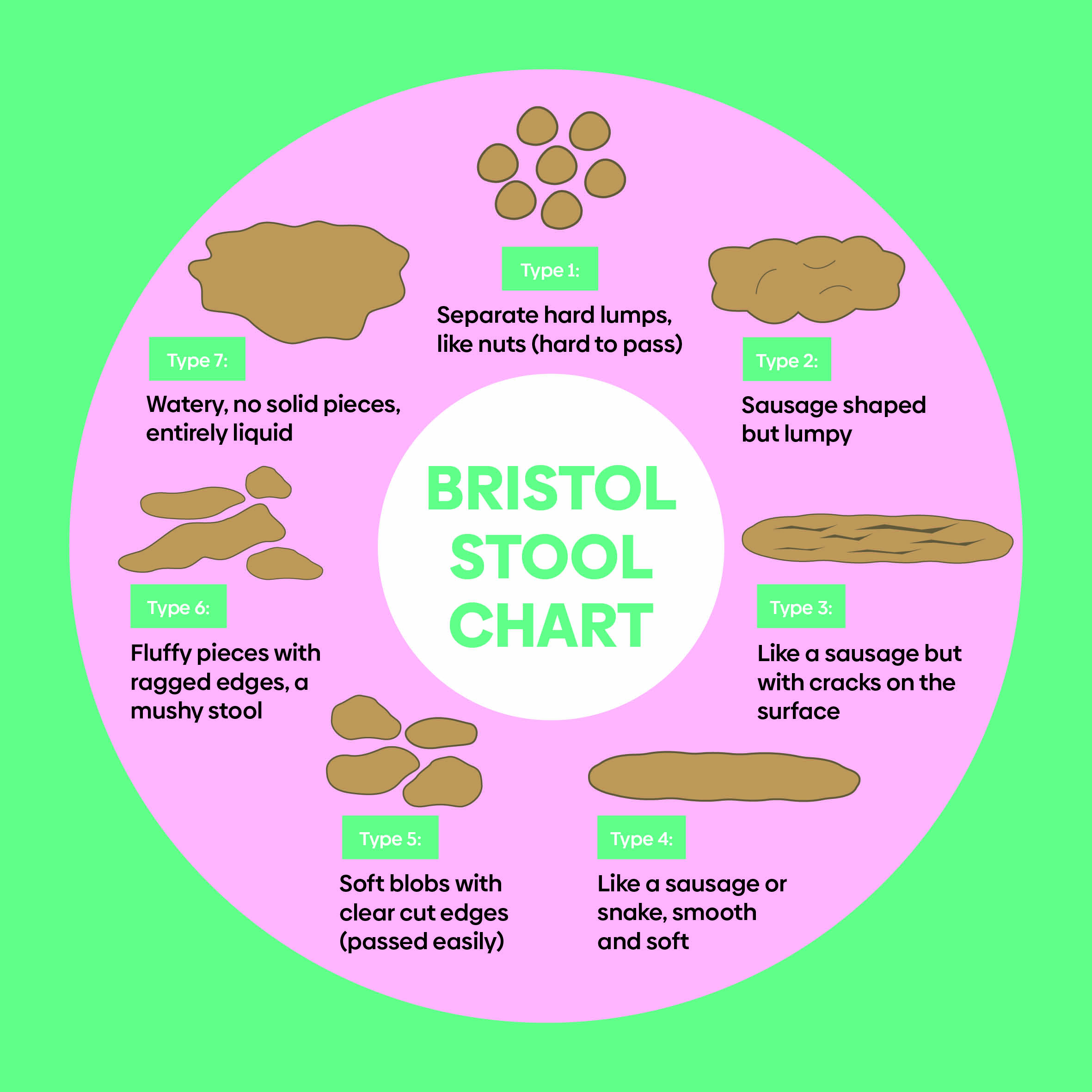
Most of the time, constipation is mild, comes on suddenly, and usually goes away after a few days. But if you’ve had constipation for longer than this, it’s a good idea to go to a pharmacist or see a doctor.
Why does constipation happen?
Constipation can happen in 3 different ways in your body, which are:
- when the muscles and nerves in your bowels don’t work properly, so it takes much longer for a poo to make its way through. This is called ‘slow transit constipation’. It’s unknown why some people get this
- when you find it hard to poo, but movement is normal throughout your bowels – this is known as ‘normal transit constipation’. Other symptoms can include tummy pain and bloating. This type of constipation overlaps with constipation-predominant irritable bowel syndrome (IBS). It can be made worse if you’re stressed or have depression
- when poo is able to make its way through to your bottom, but you find it hard to push it out – this is known as ‘obstructed defecation syndrome’. You’ll likely be straining and feeling like you’ve not fully emptied yourself. This type of constipation can be associated with a weak pelvic floor or prolapse
What causes constipation?
There are many different reasons you might get 1 of the constipation types listed above. If any of these sound like you, it can help to note them down and think about how you might make changes to help ease the problem.
Constipation may happen if:
- you’re not eating enough fibre – such as fruit, vegetables, seeds and wholegrains
- you’re not drinking enough water and fluids
- you’re not being active enough
- you often delay going for a poo when you need it
- you’re following a restrictive diet – some diets are low in fibre and carbohydrates, which may cause constipation
- you’ve changed your routine, such as going travelling
- you’re taking certain medications, including narcotics, anti-inflammatory drugs such as ibuprofen, antidepressants, paracetamol, antacids, iron pills, antihistamines or blood pressure medicines
- you’re feeling stressed, anxious or depressed – research shows gut health and emotional health are linked, and emotions such as anger, stress and depression can trigger uncomfortable symptoms in the gut, including constipation. This is often the case when there seems to be no other obvious cause for your constipation
- you’re on your period or going through menopause or the time leading up to it (perimenopause) – some women notice it’s harder to go for a poo at certain times in their menstrual cycle or once their periods have stopped, which is thought to be due to hormonal changes
- you’re elderly – as you get older, you have less muscle tone and bowel activity
- you’re pregnant or you gave birth less than 6 weeks ago – changes in hormones and your growing baby pushing up against your bowels can cause constipation
Constipation can also be caused by an underlying health condition, including:
- endocrine conditions – such as underactive thyroid (hypothyroidism) or diabetes
- bowel conditions – such as irritable bowel syndrome (IBS), inflammatory bowel disease (IBD), diverticular disease, anal fissure, bowel blockage (intestinal obstruction), colorectal cancer or bowel cancer
- neurological conditions – such as multiple sclerosis (MS), Parkinson’s disease, stroke or a spinal cord injury
- conditions that makes you less mobile – such as obesity, an injury, disability or frailty
Sometimes, however, there’s no known cause, which is known as idiopathic constipation. Remember, constipation is one of the most common gut problems in the world, and it’s even more common in women and as you get older.
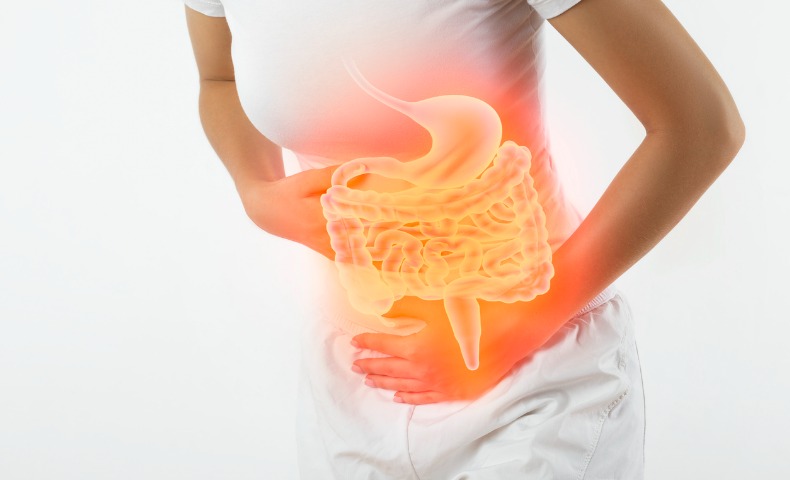
Self-care for constipation relief
There are some natural ways to relieve constipation and get your gut moving again, which may improve your symptoms within a few days.
Try these self-care tips, in this order:
- drink 2 to 4 extra glasses of water a day
- slowly add these 9 high-fibre foods into your diet, while making sure you also drink plenty of water
- steer clear of foods that contain little fibre, such as chips, fast food, meat, frozen meals and other processed foods
- exercise more often – try getting out for a daily walk or a run, especially if you’re away from home and travelling
- pay closer attention to your body’s signals – if you need to go for a poo, don’t wait
- go to the toilet at the same time and place each day
- avoid caffeine and alcohol – these can cause dehydration, as they encourage you to pee
- try meditation or deep breathing, which may help with stress and anxiety
- consider a trial of adding more probiotic-rich foods to your diet – some studies have suggested probiotics may help some people poo more easily, although more research is needed
- try self-abdominal massage – it can encourage muscle contractions, which may help to soften your poo, move it along faster and reduce tummy pain
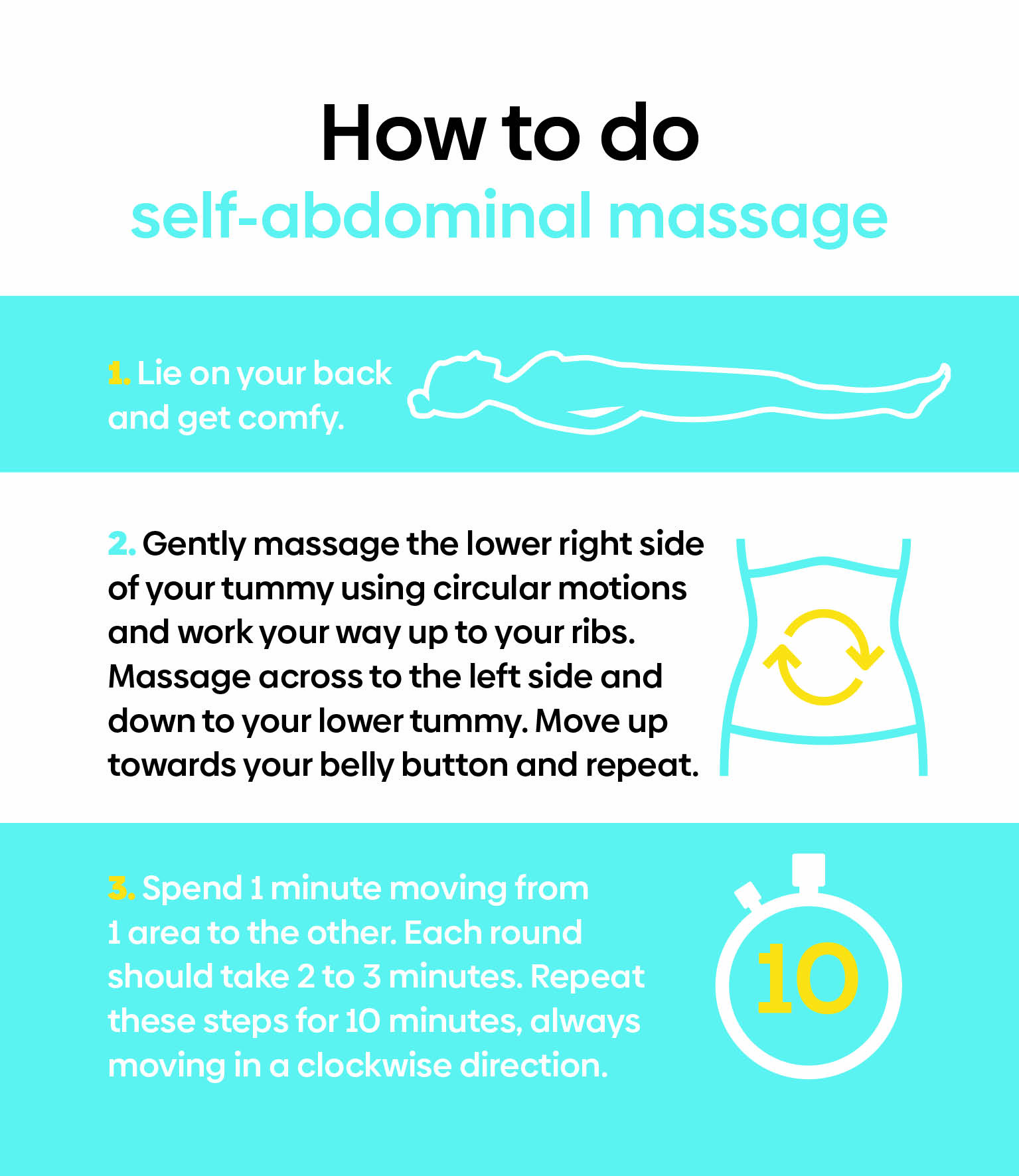
Treatment from the pharmacy
If you’ve tried changing your diet and lifestyle but nothing’s helping, a pharmacist may be able to treat your constipation with laxatives – these are medicines that can help you poo more regularly.
Laxatives you take by mouth (oral laxatives) can take between 6 hours to 3 days to work, depending on the type you use. You can also buy rectal suppositories, which are laxatives you put into your bottom (rectum). Most commonly they contain glycerol and help the muscles around your rectum to contract. They usually work in about 30 minutes.
If you’re pregnant, you should talk to your doctor or midwife before trying a laxative.
When to see a doctor about constipation
It’s perfectly normal to have a bout of constipation every now and then. But if you’ve tried the self-care tips listed above, or you’ve taken laxatives from a pharmacist, and your constipation still hasn’t gone away after a few days, speak to your doctor.
If the thought of doing this makes you feel a bit uncomfortable, you’re not alone – research shows 1 in 5 people say they’d feel embarrassed talking to their doctor about constipation. But doing so will help them work out what might be causing your constipation, and suggest the best treatment for you.
Remember, your doctor has heard it all before – it’s just part of the job for them. So make sure you fully explain your symptoms, including details about what your poo looks like when you do manage to go, and if your constipation is affecting your day-to-day life.
You should see a doctor as soon as you can if:
- you’re regularly constipated and it lasts a long time
- your constipation isn’t improving with treatment
- you have blood in your poo
- you’re in a lot of pain when you go for a poo
- you’ve lost weight unexpectedly or have lost your appetite
- you feel very tired all the time
- you’re taking medicine that’s causing constipation
- you have lower tummy pain, discomfort or bloating that doesn’t go away
- you’ve noticed a lump or swelling in your tummy or anus
You should go to the emergency department if:
- you’ve suddenly lost control of your bowels and leaked poo
- you’re constipated and start being sick (vomiting) or get severe pain in your tummy
- you have a lot of blood in your poo
You can try our Smart Symptom Checker to get more information about your health.
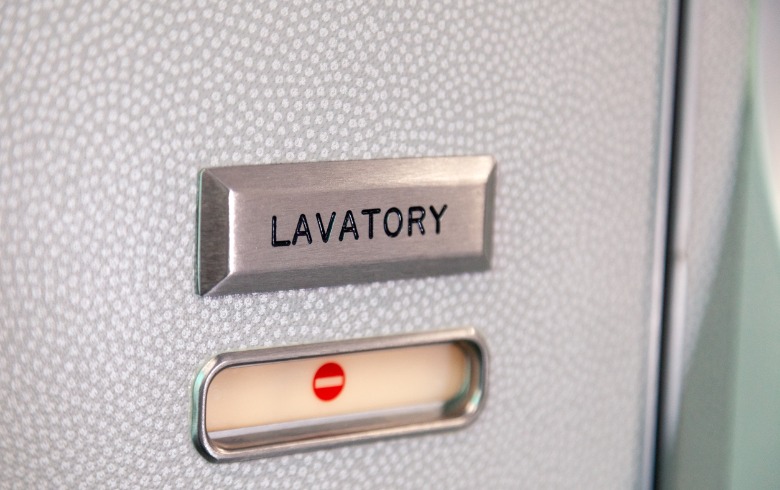
How do you get a diagnosis?
There are a few different ways your doctor can find out the cause of your constipation.
At your appointment, you’ll be asked about your symptoms – try to keep a diary that notes down how often you’re pooing, what it looks like, and anything else you’ve noticed. You can create a customised tracker in the Healthily app to build up a better picture of your symptoms, then use this record to show your doctor. They may also ask about your medical history, diet and lifestyle.
After this, you may be given a physical exam, which is when your doctor will feel around your tummy. You may also be offered a rectal exam. This is when a doctor uses their finger to check for any problems inside your rectum. It’s usually quick, and shouldn’t be uncomfortable.
Your doctor might also suggest blood and pee (urine) tests to rule out any underlying health conditions.
You may also be referred to a specialist, such as a gastroenterologist or surgeon, who may offer you further tests, such as:
- a tummy X-ray – when a small dose of X-ray radiation is used to produce images that show whether there’s poo throughout your bowel or if there’s a blockage
- transit study examination – when you take a course of special capsules that can show up inside your digestive system on an X-ray. It’s helpful for showing how quickly a substance passes through your bowels
- anorectal manometry – when a small device with a balloon at one end is inserted into your bottom. This can show how well the muscles and nerves around your bottom are working
- colonoscopy – when a camera is passed through your bottom and into your bowels to look for any problems. Your doctor may also take a tissue sample (biopsy) to check what might be causing your symptoms
Treatment from a doctor
How your doctor treats your constipation will depend on the cause. In some cases, you may be offered stronger, prescription-only laxatives.
A doctor or specialist may also offer other treatments to help your symptoms, including:
- biofeedback – when you’re taught how to coordinate your bottom and tummy muscles, which may help you empty your bowels more fully
- medicine given directly into the rectum (enema) – this may be prescribed in more severe cases of constipation. It usually starts working in 15-30 minutes, but some types of enemas can start working in minutes
- surgery – in rare cases, surgery might be suggested, for example if you have a type of prolapse when the front wall of your rectum and bulges into your vagina (rectocele)
- psychological treatments – these will be focused on helping you relax and treating chronic stress, which can make constipation worse
Complications of constipation
Constipation is usually mild and easily treated. But if it’s left untreated, or your symptoms are very severe, not being able to poo properly can lead to problems over time.
These problems can include:
- haemorrhoids (piles) – when you have swollen, inflamed veins in your bottom that may cause bleeding, itching and pain. Being overweight, elderly or pregnant can make you more likely to develop them
- anal fissure – this is a tear in the lining of your bottom, caused by hard poo trying to make its way through. Anal fissures are quite common – about 1 in 10 people gets one at some point – but they’re more likely in children and adults aged 15-40
- diverticulitis – when small bulges develop in the lining of your bowel, which become inflamed or infected. It’s more likely if you’re elderly, have a poor diet, smoke or have a family history of diverticular disease
- faecal impaction – this is when too much poo gets stuck and collects in your bottom. It’s more common in women, especially if you’re over 65
- urinary incontinence – if your pelvic floor muscles are weakened by too much straining, this can cause urine to leak from your bladder. Urinary stress incontinence is more common in women – 1 in 3 develops it at some point – and it’s more common as you get older
- rectal prolapse – when the last part of your bowel (rectum) sticks out of your anus, causing pain and sometimes bleeding. It’s not common, but it’s more likely if you’re over 50, and research also shows that more women get it
Your health questions answered
Is prune juice good for constipation?
Answered by: Healthily’s medical team
“Prune juice is often recommended for people who have constipation. This is because prunes are high-fibre fruits, which contain water and a natural laxative called sorbitol – a sugar alcohol that draws more water into your gut. Whole prunes are higher in fibre and sorbitol than prune juice, which suggests they may be more effective at improving constipation. However, some studies suggest prune juice may also be helpful, although more research is needed.”
Do eggs cause constipation?
Answered by: Healthily’s medical team
“There’s little evidence to suggest that eating eggs as part of a healthy, balanced diet puts you at higher risk of constipation. However, while eggs are high in protein, they’re low in fibre, and we know that you’re more likely to get constipation if you eat a low-fibre diet.”



